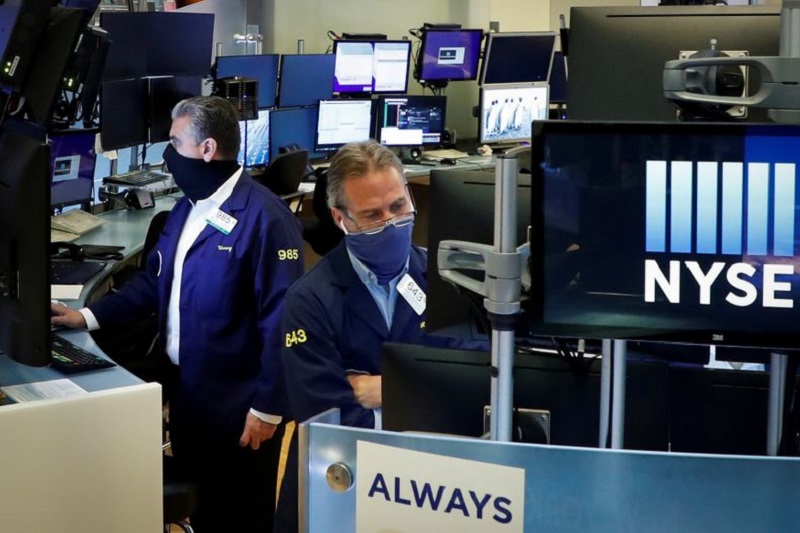By Geoffrey Smith
Investing.com -- Chinese stock markets fall as the central bank reportedly tells banks to lend less. The cryptocurrency universe is now worth $2 trillion, thanks to a surge in XRP and ether. U.S. stock markets are set to consolidate after Monday's reopening trades pushed them to all-time high closes. Credit Suisse (SIX:CSGN) fires senior managers after the Greensill and Archegos disasters, and oil prices rebound after a surprisingly large increase in output announced by OPEC and its allies. Here's what you need to know in financial markets on Monday, April 6th.
1. China reins in bank lending
China’s central bank asked the country’s biggest commercial banks to rein in their lending after a surge in credit in the first two months of the year, according to Bloomberg sources. The request is the latest attempt by Beijing to restrain borrowing, which surged last year as local authorities scrambled to support growth during the first wave of the pandemic.
The news pushed all of China’s big stock indices lower on a day when most of the rest of the world was following Wall Street higher. The Shanghai Shenzhen CSI 300 fell 0.4% and the Chinext growth stock index fell 0.7%.
According to Bloomberg, the People’s Bank of China wants new loan volumes to be roughly the same as last year. That would imply a slowdown in credit growth to around 11%, still a sizeable increase for a country where private and public debt hit 280% of GDP last year.
2. Crypto hits $2 trillion
The market value of the cryptocurrency universe hit $2 trillion for the first time, helped by a 35% surge in XRP to its highest in more than three years.
Ether, whose Ethereum blockchain is central to a burgeoning network of decentralized finance (DeFi) initiatives and applications, also rose over 3% to an all-time high.
The developments come as the craze for digital art, so-called non-fungible tokens, appears to be cooling. Additionally, analysts at JPMorgan (NYSE:JPM) noted that flows into Bitcoin funds have slowed to some $50 million a week from a peak over 10 times that much at the end of last year.
At the same time, central banks are also advancing their own digital currencies: China began testing cross-border transactions using in its own digital version of the yuan at the weekend, the first for a major world central bank.
3. Stocks set to open lower; JOLTS, Redbook eyed
U.S. stocks are set to open lower later Tuesday, consolidating after a surge to record highs on Monday that was fueled by optimism over the outlook for reopening the economy. That rally was in part an extended effect of a blowout jobs report on Friday, which saw the U.S. economy add over 900,000 jobs in the month through mid-March.
By 7:15 AM ET (1115 GMT), Dow Jones futures were down 32 points, or 0.1%, while S&P 500 futures were down 0.2% and Nasdaq 100 futures were down 0.3%.
The jobs report has sharpened focus on the monthly JOLTS job vacancies survey, which is due out at 10 AM ET (1400 GMT). Redbook research will also update on the retail sector. Stocks likely to be in focus include cruise operators Carnival PLC (LON:CCL) (NYSE:CUK), which reports earnings early, and Norwegian Cruise Line (NYSE:NCLH), which asked U.S. health authorities to approve the restart of sailings on July 4.
4. Heads roll at Credit Suisse
Credit Suisse Group AG (SIX:CSGN) (NYSE:CS) carried out a cull of senior management in the wake of twin fiascos that have cost it billions of dollars in the last month. It also suspended its share buyback program and cut its dividend by two-thirds.
The Swiss bank said investment bank head Brian Chin and Chief Risk & Compliance Officer Lara Turner will both leave, along with various other executives at lower level.
Credit Suisse said it expected to lose $4.7 billion from its exposure to Archegos Capital Management, the family office of former hedge fund manager Bill Hwang. It is also facing losses reported to be around $1 billion from exposure to Greensill Bank, the collapsed supply chain finance specialist.
5. Oil rebounds: STEO, Iran talks eyed
Crude oil prices extended their gains on expectations that the U.S. and Chinese economies will continue to drive a rebound in global demand.
Prices had fallen over 4% as the market absorbed the news of a unexpectedly sharp increase in supply from OPEC and its allies over the next three months.
By 7:15 AM ET, U.S. crude futures were up 2.3% at $60.00 a barrel, while Brent crude futures were up 2.1% at $63.47 a barrel.
Attention Tuesday will likely focus on the U.S. government’s Short-Term Energy Outlook and the progress of indirect talks in Vienna between the U.S. and Iran.
